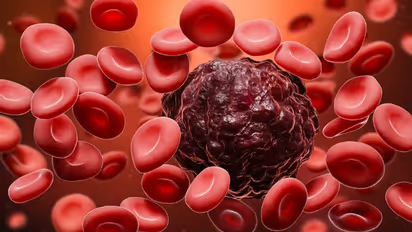World Cancer Day 2024: Know the truths and myths of Blood Cancer

Synopsis
World Cancer Day: This complicated condition is frequently misunderstood because of the common myths surrounding it, resulting in many misconceptions, unwarranted fear, and worry among patients and families. Let us understand the reality and dispel the myths around blood cancer.
Blood cancer is a scary term for all of us, evoking a myriad of emotions among many. It encompasses various malignancies affecting the blood cells. This complex disease is often misunderstood as a lot of prevalent myths surrounding this deadly disease, leading to many misconceptions, unfounded fear, and anxiety among patients and families. Let us learn the truth and bust the common myths of blood cancer.
The Truths:
Blood Cancer is Not One Disease:
Blood cancer is not a singular disease but a group of malignancies, including acute leukaemia, chronic leukaemia, Hodgkin lymphoma, non-Hodgkin lymphoma, and multiple myeloma. Each type of blood cancer has its distinct features, affecting different components of the blood or immune system, leading to varied clinical presentation. Thus, recognizing this heterogeneity is essential for understanding the complexities involved in diagnosis and treatment.
Also Read: WHAT IS CERVICAL CANCER? THE DISEASE POONAM PANDEY PASSED AWAY FROM?
Prevalent Across Age Groups:
Blood cancer can occur at any age. While certain types may be more common in specific age groups, blood cancer can affect children, adolescents, and adults alike. Early detection and diagnosis are vital in improving outcomes across all age ranges.
Most blood cancers are not inherited diseases:
Genetics can play a role in predisposing a few individuals to blood cancer. Some cases may have a hereditary component; hence it is important to understand family medical history. However, the majority of blood cancer patients we treat present with no family history, are sporadic, and are not directly linked to genetics.
Symptoms and Early Detection:
Recognizing early symptoms and signs of blood cancer is crucial for early detection. Look out for symptoms like unexplained weight loss, fatigue, frequent infections, swollen lymph nodes, and easy bruising or bleeding as this may be a warning sign of blood cancer. In this regard, regular health check-ups and awareness of these symptoms can aid in early diagnosis and prompt initiation of treatment.
Advances in treatment:
Survival of all blood cancers has improved quite dramatically in recent years. Now, we can treat most blood cancers with advanced techniques of immunotherapy, cellular therapy, and combined modalities of treatment. Treatment of these disorders is also individualized for a given patient, targeted to the underlying malignancy. We are now in the era of precision oncology where molecular Profiling of the given cancer is done and treatment is tailored to the molecular profile of the cancer of the given patient.
Also Read: Berries to Avocado: 7 foods that boost fertility
Many Myths:
Blood Cancer is Contagious:
One prevalent myth is that blood cancer can be transmitted through physical contact, sharing personal items, or even being in close proximity to an affected individual. In reality, blood cancer is not contagious and cannot be spread through casual contact. It is indeed essential to dispel this myth to reduce the stigma associated with the disease.
Solely Inherited Disease:
Genetic factors may contribute to the risk of developing blood cancer in a few patients, but the majority of cases arise from acquired mutations during an individual's lifetime. Not everyone with a family history of blood cancer will develop the disease, and conversely, individuals with no family history can still be at risk.
Only Affects Older Adults:
Blood cancer does not discriminate based on age. While certain types are more common in older adults, pediatric cases also exist. Thus, we must recognize that blood cancer can affect individuals of all ages, and age alone is not a determining factor.
Incurable and Invariably Fatal:
With advancements in treatment modalities, many forms of blood cancers are now very well treated and are curable. The prognosis depends on various factors, including the type and stage of the disease, overall health, and response to treatment. The emphasis is to be on early detection followed by appropriate therapy which can help patients combat this disease. Increased awareness will further help dispel the myth that blood cancer is uniformly fatal.
Understanding the truths and dispelling the myths surrounding blood cancer is very crucial for fostering awareness, encouraging early detection, and providing support to individuals affected by these diseases. By promoting accurate information, we can contribute to breaking down barriers, reducing stigma, and ultimately improving outcomes for those navigating the challenging journey of blood cancer.
(This article is authored by Dr. Mallikarjun Kalashetty, Consultant - Haematology, Haemato Oncology & Bone Marrow Transplantation, Manipal Hospital Old Airport Road.)
Explore the latest Lifestyle News covering fashion, wellness, travel, Food and Recipes, and more. Stay updated with trending Health News, fitness tips, and expert insights to inspire your daily living. Discover personalized lifestyle trends that keep you stylish and informed. Download the Asianet News Official App from the Android Play Store and iPhone App Store for everything that adds value to your everyday life.